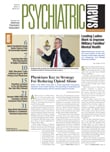In an editorial in this month's American Journal of Psychiatry, William Carpenter, M.D., and Jim van Os, M.D., outlined the still-to-be-resolved questions surrounding the inclusion in DSM-5 of a category for psychosis risk to be called "attenuated psychosis syndrome."
The inclusion of that category to diagnose individuals—invariably adolescents—with attenuated psychotic symptoms that have not progressed to full-blown psychosis is controversial and by no means a certainty. In comments to Psychiatric News, Carpenter—who is chair of the DSM-5 Work Group for Psychotic Disorders—said that field trials are under way to determine whether the diagnosis can be made reliably over time by different clinicians on the same patient and in agreement with those who have conducted the initial research.
If the diagnosis proves reliable, the work group will need to weigh the following questions outlined by Carpenter and van Os:
Will the diagnosis promote helpful treatment for these individuals?
Will the diagnosis stimulate research to prevent psychotic disorders?
Will the diagnosis unnecessarily stigmatize individuals, or will it actually promote their acceptance?
In separate introductory statements to the editorial, the two authors—who approach the questions from opposite sides of the controversy—summarized their own views.
Van Os, who opposes the creation of a new diagnostic category, said that the best hope for early intervention in psychotic disorders resides in public health measures for the population as a whole rather than in attempts to diagnose risk in individuals for what will be a low incidence of future psychosis. "Creating a diagnostic class that does not unambiguously define a specific group, treatment, or outcome does not add value for patients and their families," van Os wrote.
Carpenter, who has generally supported the inclusion of the new category, said that the evidence for attenuated psychosis syndrome as a clinical entity with predictive validity has been established and that early detection and intervention can positively alter the long-term outcome.
"There is much that clinicians can and should do for care-seeking individuals with distress and dysfunction who manifest early psychotic-like psychopathology," he wrote. "A new DSM-5 diagnosis can focus attention on this syndrome and stimulate the creative acquisition of new knowledge that may be life altering for afflicted persons."
In comments to Psychiatric News, Carpenter said that the newly proposed term—"attenuated psychosis syndrome"—reflects the idea that a disorder, as opposed to a risk for a disorder, already exists, and that it is not specilc to the development of schizophrenia.
He added that he believes some of the mistrust for the proposal may stem from early use of the term "risk syndrome," implying primary prevention rather than the existence of a disorder with implications for treatment and secondary prevention. "Rather than a parallel with hyperlipidemia marking risk for cardiovascular disease, it is more appropriate to compare [attenuated psychosis syndrome] with angina, indicating a disorder and the hope that treatment reduces risk for a more severe outcome," he said.
